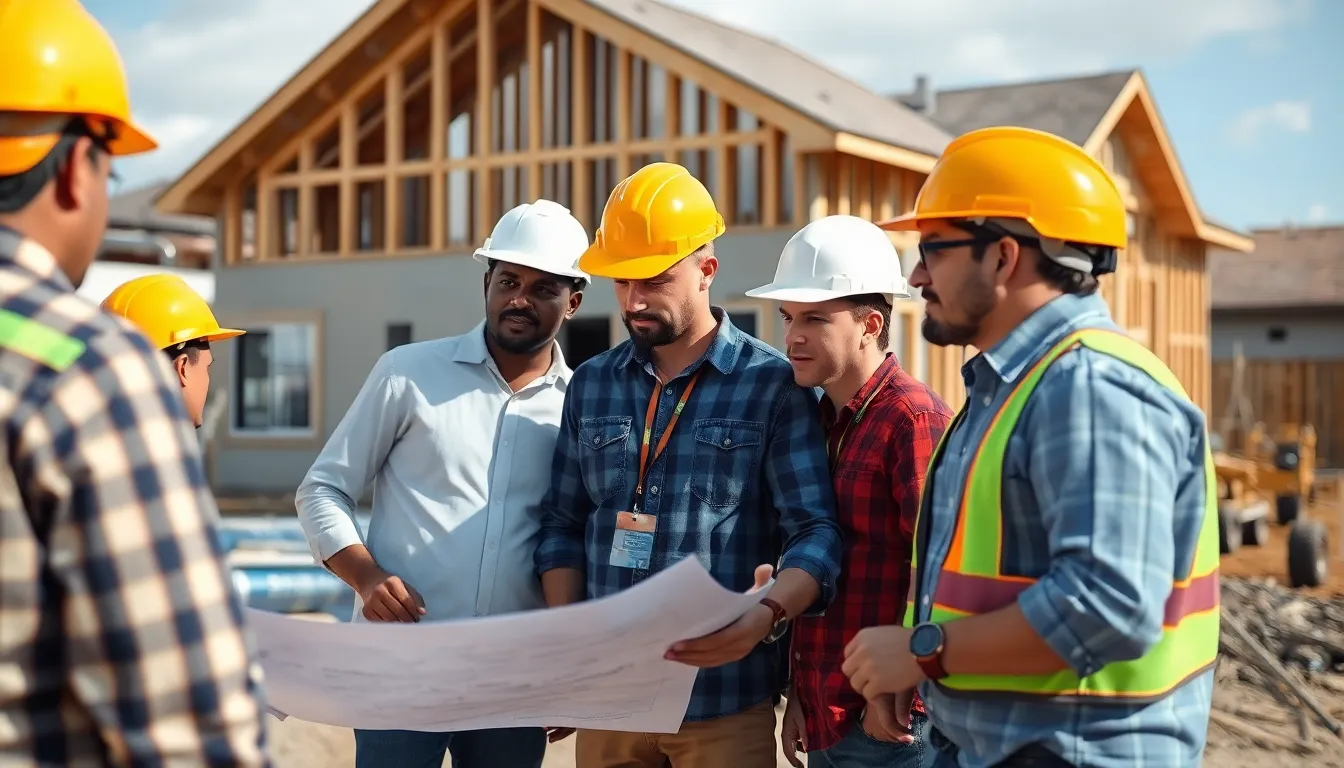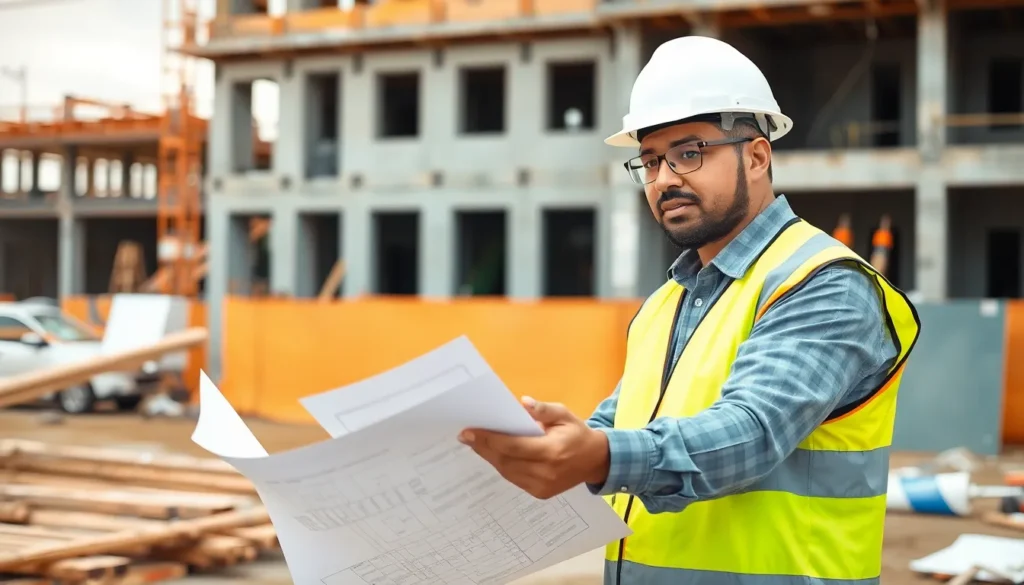Table of Contents
ToggleIn a world where DIY projects often end with a trip to the emergency room, the need for a reliable building construction company has never been greater. Whether it’s a cozy home or a sprawling office complex, these professionals turn blueprints into reality—without the drama of a reality show.
Choosing the right construction team can feel like dating in the digital age: overwhelming options, endless profiles, and the fear of a bad match. But fear not! This guide will help navigate the construction landscape, ensuring you find a company that not only meets your needs but also brings a little humor to the hard hat zone. After all, who said building dreams can’t come with a few laughs along the way?
Overview of Building Construction Companies
Building construction companies play a crucial role in the development of residential, commercial, and industrial projects. These firms not only manage the logistics of construction but also ensure adherence to safety standards and building codes. Experience often defines a company’s capability, with many successful firms boasting decades in the industry.
Services provided by building construction companies typically include design, project management, and skilled labor. Specialized teams handle various tasks such as plumbing, electrical work, and carpentry, ensuring project quality. Clients benefit from a comprehensive approach that combines planning, execution, and oversight.
Increased demand for sustainable building practices has influenced many construction firms. Companies now prioritize eco-friendly materials and energy-efficient designs to meet growing environmental concerns. Innovations in construction technology also enhance efficiency and reduce costs.
Regulatory compliance remains a significant aspect of operations. Building construction companies must navigate local zoning laws, safety regulations, and environmental guidelines. Staying informed about these requirements is essential for successful project completion.
Successful partnerships with subcontractors and suppliers enhance project outcomes. Reliable subcontractors provide specialized expertise, while quality suppliers ensure access to premium materials. Strengthening these relationships often leads to smoother project execution and timely delivery.
Ultimately, selecting the right building construction company can significantly impact a project’s success. By understanding their services, industry standards, and operational practices, clients can make informed decisions. This knowledge fosters successful collaborations and helps avoid costly mistakes.
Services Offered by Building Construction Companies

Building construction companies provide a variety of essential services tailored to different project needs. These services span residential, commercial, and renovation sectors, ensuring comprehensive coverage for clients.
Residential Construction
Residential construction focuses on creating homes and living spaces. Building construction companies handle everything from planning and design to execution and finishing touches. They collaborate closely with clients to meet specific preferences and requirements, ensuring the final product reflects individual tastes. These firms employ skilled laborers experienced in various trades, such as carpentry, masonry, and plumbing, to deliver quality workmanship. Regulatory compliance is critical, as companies ensure that all projects adhere to local building codes and safety standards.
Commercial Construction
Commercial construction caters to business needs, including office buildings, retail spaces, and warehouses. Companies in this sector tackle large-scale projects, often requiring specialized knowledge of commercial building practices. They manage complex design and installation processes, involving extensive project management to coordinate subcontractors and materials. The ability to meet tight deadlines also plays a vital role, as businesses depend on timely completion for operational success. Many companies also emphasize sustainable construction practices, opting for eco-friendly materials and energy-efficient designs that reduce long-term operational costs.
Renovation and Remodeling
Renovation and remodeling services breathe new life into existing spaces. Building construction companies assess structural integrity while updating or reconfiguring spaces to meet new demands. They guide clients through design choices, ensuring that updates align with current trends and needs. Teams skilled in demolition, framing, and finishing work collaborate to maximize aesthetics and functionality. Timeframes often vary based on project scope, yet companies prioritize keeping renovations on schedule to minimize disruption. Their attention to detail contributes significantly to the overall satisfaction of clients during the renovation process.
Choosing the Right Building Construction Company
Selecting a building construction company requires careful consideration. Factors that affect the decision lead to a successful project outcome.
Factors to Consider
Experience matters greatly. Companies with extensive experience often understand complex challenges better than newer firms. Industry reputation also plays a crucial role; reviews and testimonials provide insight into past clients’ satisfaction. Licensing and insurance cannot be overlooked; these credentials ensure compliance with regulations and protection for all parties involved. Sustainability practices are increasingly significant; companies that utilize eco-friendly materials and energy-efficient designs contribute positively to the environment. Lastly, communication quality directly affects project management; prompt responses and clear explanations facilitate smoother collaboration.
Questions to Ask
Potential clients should start with inquiries about the company’s experience in similar projects. Asking for references from past clients reveals the firm’s reliability and performance. Clients must also discuss timelines and budgets, ensuring expectations align upfront. Inquire about the team composition, including subcontractors who handle specialized tasks. Understanding the company’s approach to handling challenges can provide visibility into their problem-solving capabilities. Finally, questions about compliance with local building codes ensure adherence to legal standards throughout the construction process.
Industry Trends and Innovations
Building construction companies increasingly adopt advanced technologies to enhance efficiency. Digital tools like Building Information Modeling (BIM) streamline project planning and execution, allowing for better visualization and collaboration among teams. Incorporating drones into site surveys improves site monitoring and reduces manual labor requirements.
Sustainable construction practices remain a top priority for these firms. Eco-friendly materials such as recycled steel and bamboo are gaining popularity, promoting environmentally responsible construction. Additionally, energy-efficient designs that incorporate passive solar heating and green roofs align with the growing demand for low-impact living.
Smart technology integration also shapes current trends. Many buildings now feature smart systems that optimize energy usage, lighting, and security. These innovations not only enhance occupant comfort but also reduce operational costs in the long run.
Safety protocols benefit from advancements in technology, too. Wearable devices monitor construction workers’ health and safety in real-time, significantly reducing workplace accidents. Moreover, the use of modular construction methods increases safety as components are built off-site, minimizing risk during assembly on location.
Collaboration among stakeholders is enhanced through digital platforms. Project management software facilitates communication between construction companies, subcontractors, and clients, ensuring everyone stays informed and aligned on project goals. This transparency fosters trust and leads to better project outcomes.
Adaptation to new regulations also influences industry practices. Companies now prioritize compliance with evolving safety standards and local building codes, which can differ significantly across regions. This attention to detail ensures projects proceed smoothly without costly delays due to regulatory issues.
These trends and innovations not only shape the current landscape but also set the foundation for future developments in the building construction industry.
Challenges Faced by Building Construction Companies
Building construction companies encounter various obstacles that impact project delivery and success. Delays in project timelines often arise due to weather conditions, regulatory changes, or material shortages. These factors can lead to increased costs and frustration for both companies and clients.
Compliance with local laws poses another significant challenge. Construction firms must navigate complex zoning regulations and building codes, ensuring that all aspects of the project adhere to legal standards. Failure to comply can result in penalties, project shutdowns, or costly modifications.
Resource management proves crucial for maintaining efficiency. Companies frequently face difficulties in sourcing skilled labor, which can slow down progress. Labor shortages in the construction industry force companies to compete for qualified workers, driving up wages and stretching budgets.
Stakeholder communication also presents challenges. Misalignment among clients, subcontractors, and suppliers can lead to misunderstandings and project delays. Companies strive for clear communication channels to coordinate efforts and ensure everyone is on the same page.
Moreover, the rise of sustainable building practices introduces new complexities. Companies must balance eco-friendly materials and energy-efficient designs with budgetary constraints. Clients increasingly demand better sustainability practices, placing additional pressure on construction firms to innovate while managing costs.
Technological integration remains both a challenge and an opportunity. While digital tools can streamline processes, the initial investment in such technologies may be substantial. Companies must weigh the benefits of adopting advanced tools against the financial implications.
Each of these challenges requires careful consideration and proactive solutions. Adapting to the evolving landscape of the construction industry is essential for building companies aiming to succeed in a competitive market.
Choosing the right building construction company is essential for achieving project success. With the right team, clients can navigate the complexities of construction while ensuring adherence to safety and quality standards. As the industry evolves, embracing sustainable practices and advanced technologies becomes increasingly important.
By understanding the services offered and the challenges faced, clients can make informed decisions that align with their vision and goals. Building a strong partnership with a reliable construction firm not only enhances project outcomes but also fosters a collaborative environment that leads to innovative solutions. Investing time in selecting the right company ultimately pays off in the quality and efficiency of the completed project.








